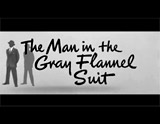
|
The
Man in the Gray Flannel Suit (1956)
In director/co-writer Nunnally Johnson's low-key, epic-length
drama with romantic elements - it was based on the 1955 novel by
Sloan Wilson (originally serialized in mid-1955 in Collier's Magazine),
and featured a musical score by Hitchcock's favorite Bernard Herrmann;
it told about a discontented 'Everyman' character, typical of the
1950s Eisenhower-era in the post-war period - the main character
was a man of conscience who faced multiple issues and sought to find
meaning and happiness in life; the film's main stars had previously
performed together in Duel in the Sun (1946):
- the film's main title character was Tom Rath (Gregory
Peck), a hard-working, decent, stolid, middle-aged
war veteran; the conservative-minded Rath
in the mid-1950s faced challenging issues with conforming and reintegrating
back into society - in both his career and married life; he struggled
to fit into the post-war period as a corporate member of society
- he currently had an "absolutely safe spot" job
at a non-profit foundation in NYC earning $7,000 per year;
in the opening, during one of his frequent round-trip train commutes
between NYC and his suburban home in Connecticut (on the New Haven
RR to Grand Central), he learned from his friend
Bill Hawthorne (Gene Lockhart) of a job possibility in public relations at
the New York-based United Broadcasting Corporation (UBC) that
involved a pay raise, but also was advised: "I don't think you'd
be very happy in that chromium jungle anyway"
- after his train arrived
at the station in Westport,
Connecticut, he was picked up and driven in their old '49 Ford family
car to his South Bay home in the middle-class suburbs (where he
had lived for seven years) by his emotionally-overwrought
wife Betsy Rath (Jennifer Jones); she was a dissatisfied, pushy,
nagging homemaker who kept complaining about their financial
situation, including a replacement for a broken washing machine
and other needed fix-ups
- Rath's three bratty, TV-addicted and hypnotized
children (between the ages of 6 and 10) included young Pete (Mickey
Maga), and two daughters Barbara (Sandy Descher, the star of Them!
(1954)) and Janey (Portland Mason, the daughter of actor James
Mason); throughout the film, they often ignored
their father (they preferred Western cowboy TV shows, with stark
depictions of good vs. evil) and seemed pre-occupied with the subject of death
- then Tom received troubling news by phone from small-town
Judge Alfred Bernstein (Lee J. Cobb), the executor of his grandmother's
estate; the call was about problems with his hoped-for cash inheritance; he shared with Betsy
that everything was depleted: "There's nothing left in Grandma's
estate"; all that was left was an "old barn of a house" that also
had an unpaid $10 thousand dollar mortgage; if they kept the place,
it would cost about $6 thousand a year in upkeep and repairs
- at this point, Betsy encouraged
him to be more enterprising and to seek "promotions, opportunities,
some good breaks... you can't just accept the way things are now";
she specifically wanted
him to interview for a more prestigious job and salary with greater
advancement possibilities; she complained about their current living
situation and urged selling both houses and getting a
better house in a nicer neighborhood: ("You know how I hate this
house, but you don't know how much I hate it! Its ugliness, its
depression, but most of all, its defeat...It's a graveyard, Tommy...It's
not a happy house"); he disagreed with all of her bold suggestions:
"I don't think this is any time to be taking chances," although
she felt he was cowardly and unambitious since his war years: "You've
lost your guts, and all of a sudden I'm ashamed of you"
- the next day on
the train, Rath asked his friend Hawthorne to set up an interview appointment
for the PR job at UBC; Rath was suffering
from PTSD angst and other emotional and social problems; while
on the commuter train, he experienced
the first of many frequent flashbacks to his memories of serving
as an Army officer during WWII ten years earlier; he was haunted
when he recalled stabbing a young German soldier with a fur-collared coat that he
coveted
- during a second flashback, Rath remembered that before
being deployed to the Pacific Theatre of the war, he was stationed
in Rome in June of 1945; he was filled with
depression that he would never return home alive from the war to his
wife Betsy; to allay his fears ("I got a little somethin' comin' down
here's gonna take your mind off all that sort of thing"), Rath was
introduced by his Army buddy Sgt. Caesar Gardella (Keenan Wynn) to
a young pretty Italian woman named Maria Montagne (Marisa Pavan); he
was glum about his future: "I wonder if I could interest you in a proposition
to be my widow?"; but then after dinner when he was encouraged
to be less pessimistic, he told her: "I like you very much, Maria.
You're more than pretty. You're beautiful" - and they kissed during
a moonlight ride in a carriage

|
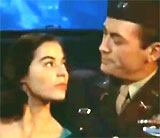
|
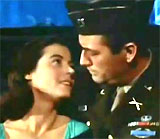
|
|
Introduced to Maria Montagne (Marisa
Pavan)
|
- in her humble, small one-bedroom place that
she shared with her cousin Gina (Sgt. Gardella's girlfriend)
and Gina's mother (she explained how all the men in their families
were dead), he was surprised when Maria asked him for something
to eat: "If you could, perhaps, give me some Spam" - and he replied
incredulously: "You mean you want Spam?"; she told him how she
needed: "any kind of food in tins or boxes"
-
Rath's six-week war-time romance soon heated
up, and on his last day and night with her, they spent time during
a rainstorm in a bombed-out mansion with a bottle of wine and warm
fire; he told her about his imminent departure, and she responded:
"Everybody I know dies or leaves me"; she worried that he would
forget her quickly: ("And then I'll never see you again. And you
won't remember for long"), but he promised
to remember her as long as he lived, even though he would be returning
to his wife; he also added: "I wish I could forget you. It would
be better. But I know I'll never be able to"; he thanked
her for helping him to no longer think about getting killed, and
instead live in the present
- she described how she was lonely when they first
met, but wouldn't be lonely ever again - she thought that she might
be pregnant and prayed to have a child: "Now I think I'll never
be Ionely again. I think I'm going to have someone of my own. My
child...I pray for it morning and night.... I want my baby to hold
and love - and love me, I hope, until I die" - the flashback ended
- back in the present, Rath affirmed that he wished
to have a noon interview scheduled for that day for the public
relations position with the national TV broadcasting company; when
he appeared on the 36th floor for his appointment, scheming and
obsequious executive Gordon Walker (Arthur O'Connell) instructed
him to write an autobiography (within one hour) about everything
he could think of about himself, what kind of person he was, and
why he wanted the job and should be hired; his written essay had
to end with the sentence: "The most significant thing about
me is..."; as Tom started to
type his response, he experienced another of his many flashbacks
to the war that were plaguing him
- the third flashback occurred after a parachute
drop when Captain Rath was ordered to create an assembly area with
his platoon until reinforcing ground troops came up the beach;
he recalled how he had accidentally killed his good friend Hank with a hand-grenade
- and kept crazily insisting that Hank wasn't dead: ("He's not
dead! Take another look at him!")
- when he was brought back to reality in the UBC office,
Rath realized his written answer would be very short, and that it revealed in a very
bland, trivial and impersonal statement that he only believed he
would do a good job after a period of learning, and wanted to offer
no further speculations about the position; when
he returned home to Betsy that evening, she became encouraged that
life might become easier for them as a family (and they might take
a short vacation trip to "shack" in Vermont)
- fortunately for Rath, during the job application
process, the powerful, go-getter businessman boss -
network president Ralph Hopkins (Fredric March), took an instant
liking to the tone of Tom's forthright, short and honest application
and was interested in hiring him; Rath
was being considered to write draft speeches for
his boss for a nationwide mental health campaign - Hopkins' pet
project
|
UBC Executives
|
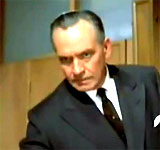
President Ralph Hopkins (Fredric March)
|
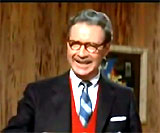
Gordon Walker (Arthur O'Connell)
|
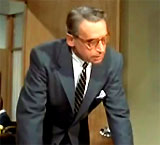
Bill Ogden (Henry Daniell)
|
- Rath was called into Hopkins' office, where a
doctor had just advised the workaholic executive to pay more attention
to his health, slow down, get more rest, and work shorter days;
before chief executive Hopkins was able to thoroughly discuss the
position with Tom, he received a quick call from
his estranged and alienated wife Helen Hopkins (Ann Harding) - revealing that
he was also suffering problems on the domestic front; she
begged him to intervene and attend to a situation that needed immediate
attention, and remain more present in his family's lives; after briefly
meeting with Rath and his top two executives over lunch, Hopkins
seemed inclined to hire Rath, but first there was some negotiation
about his yearly salary
- Hopkins visited his estranged wife Helen's home
in South Bay, CT, where she described her worries about their 18
year-old spoiled, rebellious, and unreasonable party-girl daughter
Susan "Suzy" Hopkins (Gigi Perreau); she was reported to be hanging
out in nightclubs with a "filthy crowd," including a
notorious older fortune-hunting individual named Byron Holgate
and a 45 year-old married writer-reviewer named Michael Patterson
with an estranged wife and three children
- Helen urged: "The point is that I can't do anything
with her anymore....You've got to do something. This is the time
for you to make up for all the things you've never done before";
she also mentioned the character of a second child - their idolized
and now deceased son Bobby, who had
been a model son who enlisted and then died during combat: ("He
could've had a commission, but he turned it down, enlisted, because
he thought that was the right thing to do"); Ralph explained
to Helen that he had just met Rath, whom he described as someone
who closely and physically resembled Bobby: ("A
young man who reminded me of him. Same eyes and mouth. Same kind
of smile")
- Helen returned to the subject of their wild daughter
Susan, and Ralph's responsibilities - with an ultimatum: "You've
got to give her at least the same time and thought and attention
that you give to a business proposition, a new station or, or one
of your Sunday night programs...If you don't make this effort,
I'll never want to see you again"; Ralph promised to take care
of the issue immediately
- more conflicts surfaced for the Rath family regarding
his recently-deceased grandmother's suburban Connecticut house
(known derisively by Betsy as "Dragonwyck") on 23 acres
of land; Betsy explained her bold scheme to move into the South Bay
property, and then change zoning laws to subdivide the acreage
and make a profit of $100,000 dollars; she was prematurely counting
on her husband's acquisition of the UBC job with a salary of $10,000
dollars
- Rath was hired at UBC as a "special assistant"
to Hopkins for a trial period of six months - he would be supervised
by cold and unscrupulous manager Bill Ogden (Henry Daniell), who
functioned as a politically-astute, flattering 'yes-man' assistant
to the boss; Rath's first assignment was to
prepare rough material for a speech to be delivered by his boss
at a doctors' convention in Atlantic City in the middle of the
next month
- when he returned home to tell Betsy about his new
position, he learned that she had abruptly
sold their suburban home for $14,000 with immediate plans to move
into his late grandmother's mansion; Rath and Betsy drove to the house
to visit with Edward
Schultz (Joseph Sweeney), the grandmother's long-time, corrupt
caretaker-servant
- during a violent argument with Rath in the house,
Edward contested the will: ("The will's no good, because she told
me I was in it"); he claimed that Mrs.
Walter Rath's will had bequeathed the house to him, and he would
sue for his rights to the house: ("Nobody's gonna swindle me out
of my rights") ); Rath accused
Edward of fraud: "The will leaves the
house to me"; the caretaker asserted: "Either you're trying
to cheat me or she did," and then revealed how he despised the
old lady: "That crazy, old woman. She was filthy. She
never bathed..."
- Rath contacted probate Judge Bernstein by phone
who assured him that there was no legal reason why the Raths couldn't
still occupy the house; however, Edward's objection to the
will (which would require evidence or proof) might affect Rath's
inheritance of the property
- later
one evening while Rath was in Hopkins' city-suite/apartment
speaking about his mental health campaign ("a truly holy cause")
and speeches ("If only I could make these people believe me"),
his daughter Susan arrived; Rath excused himself
- during their long father-daughter discussion, Susan
made it clear that she refused
to go to college, and insisted instead on eloping or getting
married; after her father began a long discussion about how she
should responsibly handle all of her wealth, she claimed she didn't
care about money or power: "I'm not interested in money. I
think money's a bore"; Hopkins became
worried about Susan's non-chalant attitude and told her: ("And,
frankly, darling, leaving a lot of money to you would be like giving
a gun to a baby"); she vowed to not
let money ruin her life as it had destroyed her parents' lives:
("I'm not gonna let money ruin my life the way it's ruined
yours and mother's")
- he offered to help her and work with him: ("Now,
I can't undo the past, but I would like to be of more help to
you in the future") and suggested
that she move into his apartment with him, to get to know each other
better, and provide her with job placement assistance; Susan
vowed she didn't want to work at all, and accused him of being incapable
of loving anyone: ("You've never paid any attention to me before....Oh,
what a hypocritical thing to say. You've hardly bothered to see me
since I was born....Why can't you be honest about it? You don't love
me, and you don't love Mother. To tell you the truth, I don't think
you love anybody - and I don't wanna be like that"); she rejected
anything offered to her: "I don't wanna have anything to do with
you" as she stormed off to the elevator
- meanwhile, Rath's five submissions of a draft for
his boss' speech were summarily rejected by Ogden ("It's got no
oomph") without any constructive criticism, although they had not
been forwarded to the boss; Rath was removed from the assignment
- Rath phoned Judge Bernstein to seek further legal
advice about the ramifications of Schultz' dubious claims to the house;
Bernstein had received from the caretaker a typewritten letter
on Mrs. Rath's stationary, dated January 18, 1953, with her alleged
signature, that stated: "....I hereby bequeath my entire possessions
including my house and land to Edward F. Schultz, who has served
me faithfully for more than 30 years"; the courts would have to
settle the dispute
- in Hopkins' office, Rath was
shown Ogden's alternative, platitude-filled empty speech that had
been suggested to the boss by "the boys"; Rath
realized that he would be asked the next day by Hopkins to provide
his honest opinion of the speech; later that evening at home with Betsy,
she truthfully criticized the alternate speech draft as boring, a "little silly" and
then as "dreadful"; they argued about how to
handle his response to Ogden; the issue in the "loaded situation" became
-- Should he tell the boss the truth, or please him by playing along and telling
him only what he wanted to hear (so that he wouldn't lose his job)
- Betsy coaxed him to be less
wishy-washy and show some honesty and "guts" and not
be a yes-man: ("The real idea was that I wanted you to go
out and fight for something again like the fellow I married, not
to turn into a cheap, slippery yes-man"); however, Tom felt
he must abide by 'office-politics' with concerns about how his
integrity had become more difficult with a wife and three children;
Rath affirmed: "I
never wanted to get into this rat race, but now that I'm in it,
I think I'd be an idiot not to play it the way everybody else plays
it"; she ended the conversation by questioning his integrity
as a decent man, and wondering whether he had compromised the truth
in other situations: ("...for
a decent man, there's never any peace of mind without honesty. I've
always thought of you as a decent man. Right now it just makes me
wonder how long it'll be before you decide it'll be simpler and
safer not to tell me the truth")
- the next morning in his office, Judge
Bernstein accused Schultz of being dishonest by possibly forging the
bequest letter, taking advantage of Mrs. Rath's near-sightedness, getting
kickbacks from her padded checks (that he signed or typed) when he
paid bills to tradesmen, and his "enormous bank balance" after having
fraudulently cleaned out her savings and accumulated a large fortune
of over $78,000 in his bank account; Bernstein claimed it was
easier to be slick in the city than in a small-town: ("That's what's
so interesting about a small town. You ask around about somebody who's
lived there for a while and you'd be surprised what all the people
have found out about him. If you're gonna be slick, the smart thing
is to be slick in the city. They're dumber there")
- then Rath visited his boss in his suite-apartment,
and turned cowardly at first and judged Ogden's alternate speech
as acceptable; but then, he listened to Hopkins' receipt of a distressing
phone call about his daughter eloping and getting married in Greenwich,
CT to Holgate that same morning; Rath abruptly changed his
initial critique of the speech - and called it "phony" and "untrue"
for presenting Hopkins as "a very simple, uninformed man" who was
unaware of the problems in mental health, although the audience
would know differently; Rath proposed another approach: "I'd tackle
these people on very practical grounds. I would tell them what
I was equipped to do, better than anybody else in this country";
Hopkins viewed the advice as "very helpful," and then due
to Rath's honest assessment, Hopkins was reminded of how his son
Bobby had done "the right thing" during WWII by refusing
an officer's commission and was subsequently killed in action as
an enlisted private
- in the film's most crucial turning-point sequence,
Hopkins instructed Rath to spend more time with his own kids: ("Don't
let anything keep you away from your family"); he then reminisced
about how
he had treated his business affairs as a top priority, rather than
balancing his work with his family life - it was something he now regretted;
the only way that he had found success was by devoting
his entire life, body, and soul to it; and family-men couldn't
run big successful businesses: ("Somebody's
got to do it. Somebody's got to dedicate himself to it. Big
successful businesses just aren't built by men like you. 9 to 5 and
home and family. You live on 'em but you never built one. Big
successful business are built by men like me. They give everything
they got to it. Live it body and soul. Lift it up regardless of anybody
or anything else. Without men like me, there wouldn't be any big
successful businesses. My mistake was in being one of those men"); Rath
came to realize that the success of his boss had come at the cost of
personal happiness, and at the expense of his family
- as Rath entered his work building's elevator, he
came across his old Army friend Sgt. Gardella; at 5:30 pm that
evening in the building's bar over cocktails, Gardella
told Rath how he had married his Italian girlfriend Gina (Maria's
cousin), and how Maria had also married a lame fellow named Louis
Lapa a few months after they left; Rath described how he had written
to Maria after the war, but hadn't received a reply; Gardella told
him that Maria had a little boy, and had moved in with Gina's mother
in Italy during desperate, tough, war-ravaged times; Gardella was
helping to support both families; Rath asked about Maria's husband
and was told he was killed a few years earlier during a riot
- Gardella handed Tom a sealed letter addressed to
him from Maria, with an enclosed picture of her son: (excerpt: "The
boy needs help. He's a good boy"); Tom
began to suspect that his war-time romance had led to her impregnation;
their love-making had produced a secret love child son and he felt
obligated to send money to her; his
first inclination was to keep his past relationship private: ("I'll
have to keep my wife from knowing, of course"), but he would inevitably
be forced to honestly acknowledge to his wife and family what had
happened during the war, especially now since he felt personal
responsibility and was compelled to offer paternity support for
Maria of $100 a month
- when he returned home to Betsy that evening, he
confessed two instances to illustrate his honesty and truthfulness;
first, he explained how he had told his boss, with absolute candor,
that the alternative speech was terrible; and then he brought up
a subject that wouldn't be "easy" - he had just learned that during
the war in Italy, he had fathered an illegitimate child and now
vowed to help support the mother and especially her son; he loved
her then, but did not love her now; he asked for Betsy's understanding
about the stresses of war he faced at the time: ("I don't know
how to make you realize the way things were then"); he
remembered killing a total of 17 men close-up during combat, slitting
a young German soldier's throat for his coat, and killed his best
friend with a grenade; he explained how he met the girl when he
was at his most hopeless, scared and depressed state: "When I met
this girl, I was sure that I'd never see you again. I was certain
that I'd be killed in the next action"
- Betsy told Tom how she had
almost gone crazy during the summer he was involved with Maria
in mid-1975 when she didn't hear from him; she began to doubt their
current empty relationship and asked torturous questions: "Did she
love you more than I do? Were you happier when you loved her?...Do
you think of her now when you're kissing me?"; although Tom vowed
he loved his wife more than ever: ("You told me to be honest, and
I'm being honest. I've never loved you as much in my life as
I love you at this minute. And I've never wanted anything so much
in my whole life as I want your understanding")
- the enraged
and betrayed Betsy told him not to touch her and ran out
of the house where they collapsed together on the lawn; she suggested
that he go back to Italy, but he replied it was unnecessary since
he had already made his choice and was dedicated to her ("I made
it up the first minute I ever saw you"); she recklessly raced off
in the family car, and by the next morning, Tom was summoned to
the South Bay police station to pick her up after she ran out of
gas and was located walking on the Merritt Parkway
- as the film ended, Rath was suffering with multiple
family issues, when he received a phone-call request from his boss
to accompany him to California for business regarding the health
campaign, Tom declined when he decided to forgo career advancement
in favor of spending more time with his family as a '9 to 5' man:
("Well, you remember those 9:00 to 5:00 fellas you were talking
about?... I'm afraid I'm one of them"); he finally realized
that the fate of his workaholic boss was also happening to him;
Hopkins respectfully accepted Tom's reasoning about how he needed
to remain home, but also asked Tom to provide him with his version
of the speech ("We'll go over it together, and you can work on
it while I'm away")
- in the conclusion set in Judge Bernstein's office,
Tom (with a reconciled Betsy in attendance) asked for the Judge
to help handle a "personal matter" - regular monthly payments of
$100 to an unmarred mother Maria in Italy, but without personal
correspondence; Betsy added that they eventually wanted to set
up a trust fund for the young son; moved by Betsy's added gesture,
Bernstein offered his services for free, and noted: "God's
in his heaven - all's right with the world"

Final Scene in Judge Bernstein's Office
|
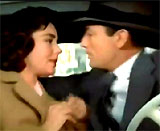
Tom to Betsy: "Would you mind if I tell you, I worship you?"
|
- after they left the office and sat in their car,
Tom expressed his love for Betsy: "Would you mind if I tell
you, I worship you?" and they smiled, embraced, and kissed
|
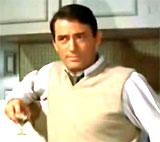
Tom Rath (Gregory Peck)

Betsy Rath (Jennifer Jones)
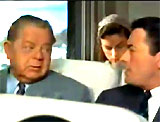
On the Train with Bill Hawthorne (Gene Lockhart), Tom Expressed an Interest
in a Job Interview
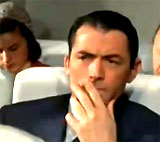
Tom's First Troubling Flashback to War Years

Tom Stabbing a Young German Soldier To Acquire His Coat
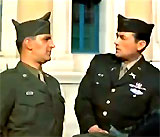
Rath's Second Flashback with Sgt. Gardella (Keenan Wynn) in Rome, Italy,
Before Deployment to the Pacific

Tom's Heated Romance with Maria Montagne (Marisa Pavan)
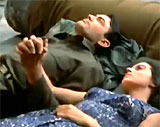
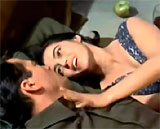
Last Night Together with Maria in Bombed-Out Mansion
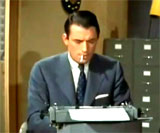
Rath Typing Out Application Essay at UBC
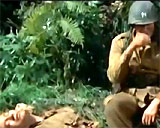
Third Flashback: When Tom Denied His Best Friend Hank Was Dead
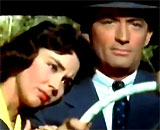
With Wife Betsy, Telling Her About His UBC Job Application
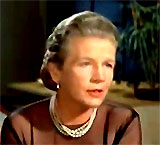
Hopkins' Estranged Wife Helen (Ann Harding)

Grandmother's Home: "Dragonwyck"

Rath's Violent Argument with Caretaker Edward Schultz (Joseph
Sweeney) Over His Grandmother's Will
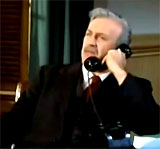
Probate Judge Bernstein (Lee J. Cobb)

Elevator Operator Sgt. Gardella
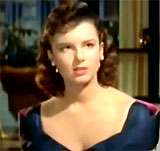
Hopkins' 18 Year Old Daughter Susan ("Suzy")

Edward Schultz Accused of Being a Dishonest Man in the Judge's Office

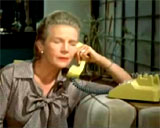
News of Hopkins' Daughter's Elopement - Distressing to Her
Parents
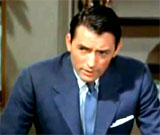

Rath's Honest Advice on the Convention Speech to His Boss Hopkins
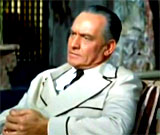
Hopkins' Regret About Devoting His Entire Life to Business Rather Than
His Family

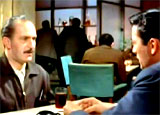
Rath with Sgt. Gardella, Now an Elevator Operator

Rath Reading Maria's Letter to Him About Her Boy
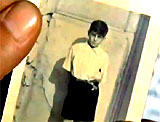
Picture of Maria's Son
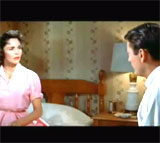

Divulging to Betsy That He Fathered a Son in Italy During the War

Betsy's Enragement and Feelings of Betrayal Over Tom's Confession

Collapsed Together on Front Lawn
|

































